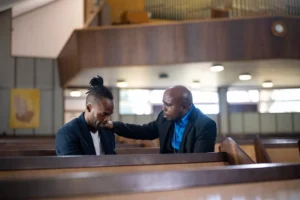When I sat down one morning in the spring of 2020 and opened my Bible to the book of Psalms, I was expecting to find poetry that might give voice to my emotions. What I wasn’t expecting was a crash course in redemption history.
Like a lot of people, those early days of the pandemic were difficult for me to process. I was working from home, and before too long I was out of a job entirely. Church transformed into a livestream I could watch from my couch. Time with friends turned into intermittent texts and phone calls. Fear filled my news feed and soon, my mind: How long will this last? Should I wipe down the mail before setting it on the counter? Two masks or just one?
I tried to look on the bright side. I told myself that with all this extra time at home, I could finally build some new healthy habits into my life. I could plant a garden, exercise more, and spend regular and consistent time with the Lord. That last one was especially important, so I decided to start a daily practice of waking up early to read my Bible.
I picked the Psalms as my starting point because I knew the book was filled with “real life”— lots of raw emotion, heart cries to God, and unquenchable longing. In that season, that felt right somehow. Oftentimes I didn’t know what to pray; I was hoping David and the other psalmists might help me put words to my anxious thoughts. But as I began reading and digging in, I found so much more.
The cross-shaped psalm
It’s not a secret that the Spirit of God inspired all of Scripture. The New Testament announces this plainly: “All Scripture is breathed out by God and profitable for teaching, for reproof, for correction, and for training in righteousness, that the man of God may be complete, equipped for every good work” (2 Timothy 3:16–17). Even so, I wasn’t prepared to find the fingerprints of God’s Spirit all over the book of Psalms.
Take Psalm 22, for example. Penned by David, it describes a harrowing experience, the details of which have been lost to history. We don’t know exactly when David wrote the psalm or what the situation was that prompted it. What we do know, however, is that David’s words of anguish perfectly describe Jesus’ sacrifice on the cross a thousand years after he wrote them.
“They have pierced my hands and feet,” David says (v. 16), though the torture of crucifixion hadn’t yet been invented in his day. “All who see me mock me; they make mouths at me; they wag their heads,” he reports (Psalm 22:7). Centuries later, Matthew says of Jesus, “And those who passed by derided him, wagging their heads” (Matthew 27:39). “They divide my garments among them, and for my clothing they cast lots,” David writes (v. 18). It’s as though he can peer into the future and see the soldiers at Golgotha passing around Jesus’ clothes (see John 19:23–24).
Jesus famously recited the words of Psalm 22:1 from the cross, saying, “My God, my God, why have you forsaken me?” (Matthew 27:46). Those who could hear Him would have recognized the opening line of the psalm. In those days, the first few words could be shorthand for the entire psalm, so those with ears to hear would understand that Jesus referred to the whole song, including the triumphant ending: “They shall come and proclaim his righteousness to a people yet unborn, that he has done it” (Psalm 22:31). Jesus knew He had done it indeed.
Most Bible readers who make that connection understand that Jesus is reading His situation back into David’s experience. Some may even wonder if the Gospel writers embellished their accounts to make Jesus’ crucifixion match the psalm. But that simply won’t do. Sure, there is some looking back, but with all the details David includes in his song, it’s difficult to believe that’s all that’s happening. God, who declares “the end from the beginning and from ancient times things not yet done” (Isaiah 46:10), knew precisely what would happen to Jesus, and He inspired David to write about it a millennium before the fact.
Bible study by the Spirit
Sometimes, the context for a psalm’s composition is given to us, and as a result we receive a new perspective on a familiar story. Psalm 34 is one such psalm. The description passed down tells us, “Of David, when he changed his behavior before Abimelech, so that he drove him out, and he went away.” This episode is recorded for us in 1 Samuel 21:10–15.
Here’s the breakdown: David is on the run from King Saul and has decided to hide out in enemy territory — specifically Gath of the Philistines, the hometown of Goliath, the freakishly large foe he toppled with a stone and a sling some years earlier. But when the locals figure out who David is, the young warrior decides to take drastic measures: He pretends to be insane, banging on doors and allowing his spittle to collect on his beard in frothy disgustingness.
The plan works well enough, so in Psalm 34:19–20 David writes, “Many are the afflictions of the righteous, but the Lord delivers him out of them all. He keeps all his bones; not one of them is broken.” When I first read this, I scratched my head. What difference did it make that David hadn’t broken any bones while he was living among the Philistines? Would God’s deliverance have been any less powerful if David had left Gath with a busted toe or a broken arm? Over the years, however, I’ve learned that when something in Scripture is weird, it’s probably important.
Every Israelite listening to Psalm 34 would have immediately thought of the lambs of Passover when they heard about unbroken bones: “It shall be eaten in one house; you shall not take any of the flesh outside the house, and you shall not break any of its bones” (Exodus 12:46). During the first Passover, the reason for this prohibition was that God wanted His people to eat quickly and be ready to go when the time came to leave Egypt. It was an urgent situation; there was no time for bread to leaven, no time to break off a lamb shank and pack leftovers. They needed to move.
In the years that followed, the lamb came to symbolize a perfect sacrifice. Physical purity represented the moral purity that no Israelite could muster. The blood of the perfect for the imperfect. Broken bones would not do. In Psalm 34, David is saying that God has protected him like one of those spotless lambs. In God’s eyes, he was holy and pure. Fast-forward ten centuries, and it is Jesus who is our perfect, unblemished Lamb: “But when they came to Jesus and saw that he was already dead, they did not break his legs…. For these things took place that the Scripture might be fulfilled: ‘Not one of his bones will be broken’” (John 19:33).
In Psalm 34, the Holy Spirit is giving us insight into David’s present situation while also helping us look back on Israel’s history and pointing us ahead to Jesus’ perfect sacrifice. In a single verse of this psalm, the Spirit has invited us into a Bible study that stretches from the book of Exodus to the gospel of John and helps us to understand just how God sees all of us who have been made righteous by Christ’s work on the cross.
What matters most
The Psalms is a collection: 150 songs compiled into five books by unknown scribes and editors years after the psalms were originally written. It is sometimes unclear why certain psalms were grouped together, but the opening and closing psalms act as bookends to remind us of what’s most important.
Psalm 1 tells us there are two paths to choose: “the way of the righteous” and “the way of the wicked” (v. 6). This is a message that’s repeated throughout Scripture. It’s the tree of life versus the tree of the knowledge of good and evil (Genesis 2:9; 16). It’s the sacrifice of Elijah versus the sacrifice of the prophets of Baal (1 Kings 18:20–40). It’s the narrow gate and the broad road (Matthew 7:13–14). There is no decision we will face in this life more crucial.
Not to be outdone, Psalm 150 declares, “Let everything that has breath praise the Lord!” (v. 6). It’s as though the Holy Spirit, knowing these would be the final words in Israel’s songbook, wants to remind us that we were created to bring praise to God. At the same time, when we realize our desperate need of a Savior, we will recognize the only thing we have to offer to God is the breath in our lungs. Even our choice of “the way of the righteous” is only possible by God’s grace.
When we come face to face with the overwhelming, unrelenting, and outrageous love of the Father, the only appropriate response is to sing. Is it any wonder, then, that the longest book in the Bible is an epic playlist given to us so that we might draw near to our King?
Copyright 2022 John Greco. All rights reserved.










